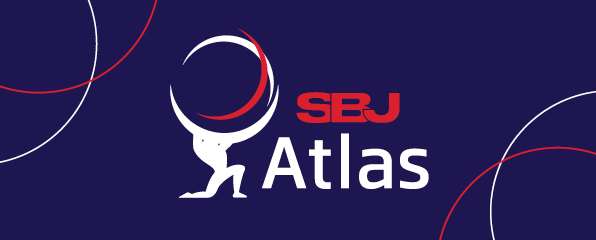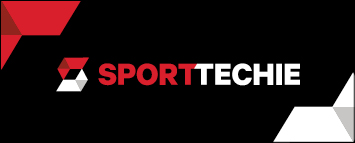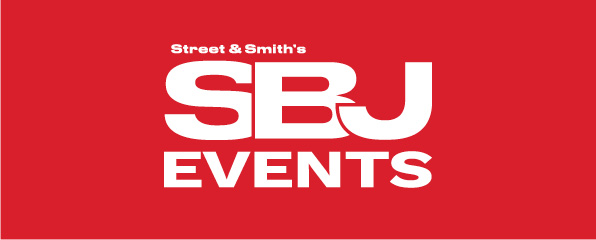Community Engagement, Diversity and Inclusion at Heart of GEODIS Park Build
When tasked with constructing a new stadium, builders must answer a simple question about their design and its implementation. “How do we create a venue that is meaningful to the local community?” For Mortenson and its joint venture partner Messer Construction Co., which led the charge on building the new Nashville SC stadium, GEODIS Park, the answer was simple: bring that local community into the fold.
The 30,000-seat, soccer-specific stadium first opened its doors May 1 for the new club’s first home match, welcoming Nashville soccer fans to a venue which was built, in large part, by their fellow citizens. And because Mortenson set — and reached — a clear set of goals for the inclusion of women-owned and minority-owned businesses in the construction effort, fans now get to enjoy a stadium built by a workforce as diverse as they are.
“This commitment to community is integral to who we are as an organization — it's woven into everything that we do,” said Mortenson Community Empowerment Manager Shanae Phillips. “It's part of our values and our philosophy here.”
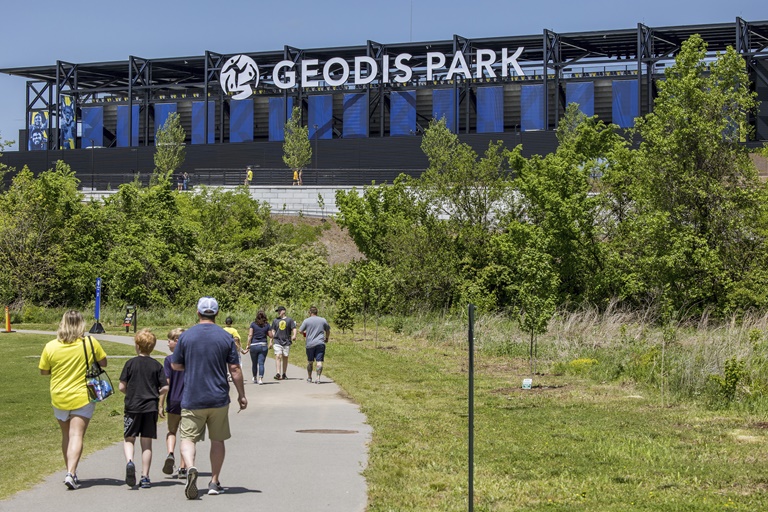
Above: Fans enter GEODIS Park for the first Nashville SC game against Philadelphia Union on May 1, 2022
According to Mortenson’s Community Empowerment report for the GEODIS Park project, the company’s diverse-business goal was 30%. That goal was exceeded by a large margin, achieving 36% participation of diverse businesses in the project. In total, $75.8 million was awarded to diverse firms, with $69 million going to 71 different women-owned and minority-owned firms.
“Our approach is really about creating relationships in our communities where we are living, where we are working to help open doors to economic opportunities for people and for businesses who are traditionally underrepresented in our industry,” Phillips said.
That was made possible through partnerships with Pinnacle Construction Partners and Business Resource Group. Business Resource Group’s Carol Greenlee helped organize community outreach for the project, bringing the Nashville community on board. According to Greenlee, Mortenson made diversity and inclusion a top priority.
“It was just as important for us to make good on the inclusion process as it was in making good on the specifications of any part of the building of the stadium,” Greenlee said. “The lighting, the steel and any other part of the stadium — the inclusion part was just important to get right.”
That’s not a common phenomenon in this industry, according to Greenlee, but one which helped stoke confidence among local contractors and workers that they were a valued part of the construction effort.
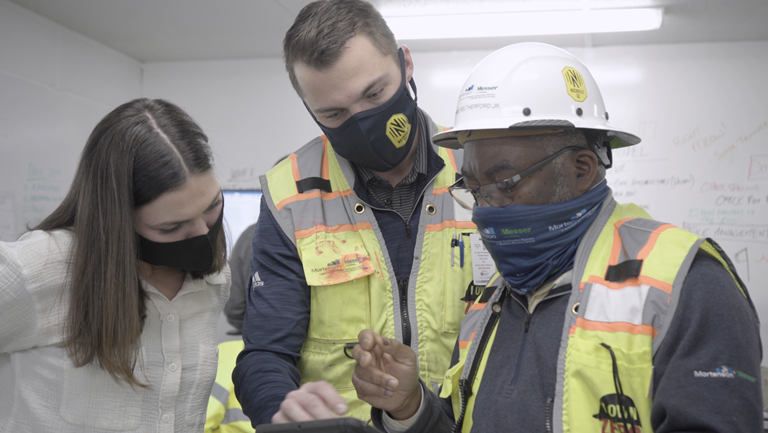
Above: Project engineers Melanie Traylor and Joe McGovern chat with Jimmie Rethelford (project engineer with Messer) to coordinate a food service refrigerant line penetration through a masonry wall
“It said that they were serious — that they walked the walk. You can talk it all day long, but unless you put the emphasis on it, unless you put the resources behind it, it falls short,” Greenlee said. “The people, the workers, they felt that. They felt that they were just as important as the big-time contractors.”
In addition to the diversity of the workforce, Mortenson’s community engagement plan also focused on drawing upon the Davidson County/Nashville area to source workers for the project.
“You have got over 501,604 hours worked by 800 women and people of color. You had 1,577 total workers and 76% of those were Tennessee residents,” Greenlee said. “That’s saying that you made an effort. It's a testament to how you can engage a community to embrace your projects, and they become a part of it,” she added. “I left there feeling, ‘That's one of the better projects I've ever worked on.’"
Part of Mortenson’s community engagement plan has to do with leaving the community it builds even better than when it arrived — more than a simply transactional relationship, according to Phillips.
“We really are trying to build relationships with these firms and kind of understand, ‘What is it that you need? What can we help you with through your involvement on this project?’” Phillips said. “At the end of the day, people and businesses are what is behind a percentage.”
According to Michael Carter, Co-Founder and Managing Partner of Pinnacle Construction Partners, working with Mortenson has opened opportunities for his firm that had never been available before — like taking the lead on the new Nashville SC training facility — and helped him learn best practices in the industry as his business evolves.
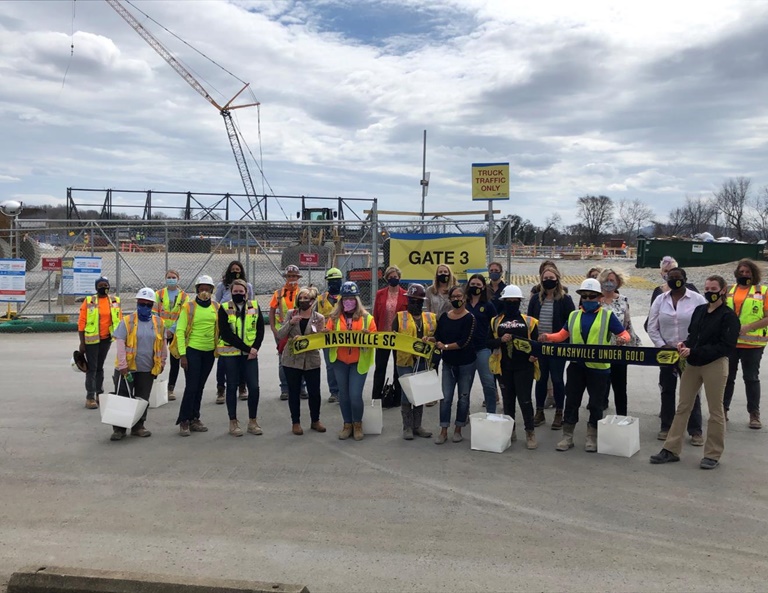
Above: A group of Mortenson | Messer and subcontractor women pose during the 2021 Women in Construction Week, an annual event across the industry
“They have got the right leadership, the right systems and the right process in place,” Carter said. “We were able to look at gleaning and being able to experience their systems and their process and interface and interact with their leadership, which really paved the way for us to look at building not only our resume, but more critically building on our systems and processes.”
“This example of Pinnacle is really what we love to see,” Phillips said of Pinnacle’s growth. “That's what we're striving for — the growth of these local, diverse firms here on the project, so that even long after our project is done, they have developed some skills to help lay the foundation for future success.”
With GEODIS Park now open and hosting fans, Nashville has what can truly be described as a “home stadium” — a venue brought into existence by the community itself, along with a little help from Mortenson. Learn more about Mortenson’s community empowerment efforts.

